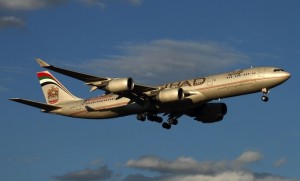
The global air travel map is being redrawn as growth rates slow in traditional markets and surge in evolving economies including India, Africa and Latin America, Etihad’s CEO James Hogan has said.
His comments coincided with the announcement by Etihad Airways of a 24 per cent strategic equity investment in Jet Airways, the second largest airline in India.
Hogan said the major shift occurring in the global economy was impacting significantly on the air transport industry, requiring airlines to reshape their networks and enter new partnerships in order to remain competitive.
“Legacy markets are growing, but at a slower pace. Emerging markets are surging,” Hogan said. “Traffic patterns and demographics are changing. Traditional air transport hubs are declining in prominence, with growth constrained by inadequate infrastructure and ingrained political resistance to change.
“The Arabian Gulf – the geographic centre of the world – is now evolving as the global centre of the air transport industry, with the number of passengers passing through Gulf hubs outstripping industry growth rates.”
IATA figures show that in February 2013, Middle East hub traffic was up by 10.6 per cent over February 2012, compared with the global growth rate of 3.7 per cent.
Hogan said the airline industry was entering a new phase of consolidation, as no single carrier could satisfy the global growth in passenger traffic. He said a new hybrid business model was emerging, in which minority equity alliances were bridging the gap between full mergers and legacy alliances.
“The new business model delivers benefits which previously were available only through full mergers or acquisitions,” Hogan said.
These benefits include joint procurement, cross-utilisation of aircraft, joint training of pilots and cabin crew, shared sales forces in common destinations, and dual focus on revenue growth and cost reduction, Hogan explained.
Etihad began operations in 2003 and in 2012 carried 10.3 million passengers. The airline has a fleet of 73 Airbus and Boeing aircraft, and more than 90 aircraft on firm order including 41 Boeing 787-9s and 10 A380s.















